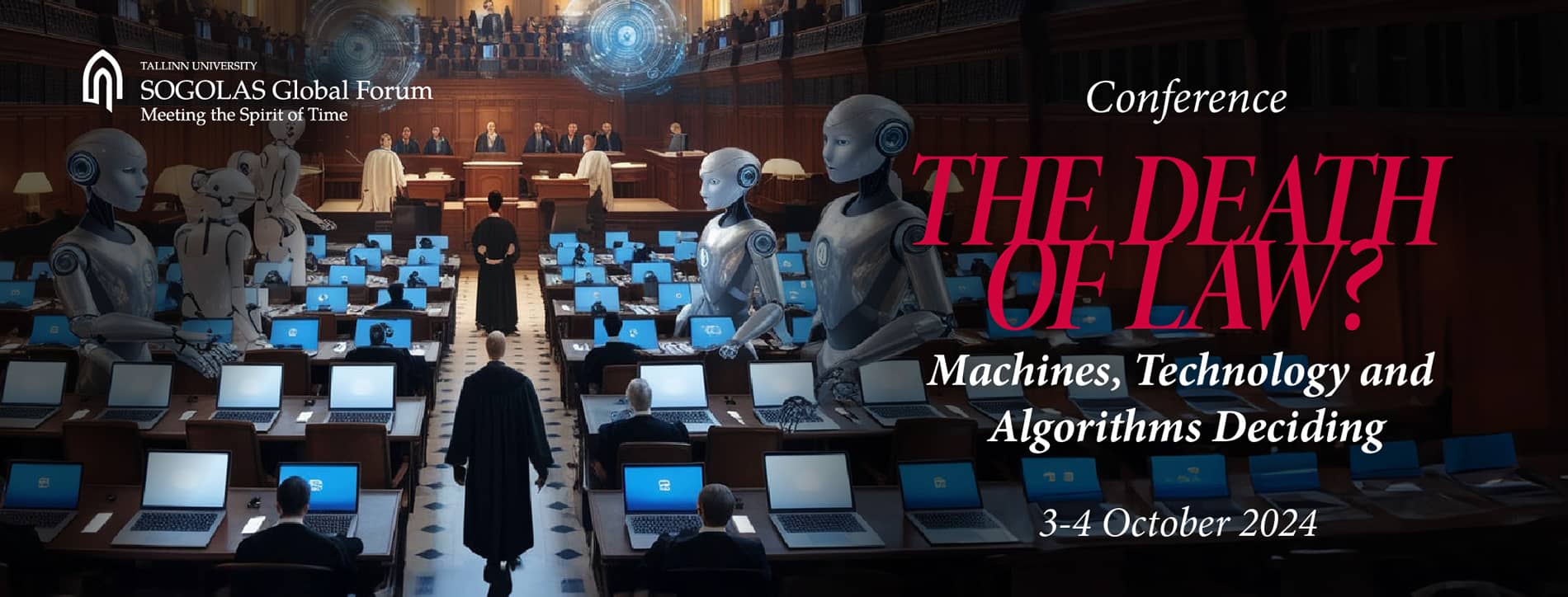Conference The Death of Law? Machines, Technology and Algorithms Deciding
About
Digitalization and artificial intelligence are deeply changing the landscape of our way of life, including the field of law. We are confronted with an increasing digitalization of legal processes that, while making the legal institutions more effective, are in a sense about to change their rationale and mode of operation. As a matter of fact, rules are replaced by algorithms, making them a sort of preventive measures or a device against a possible deviant behaviour. Algorithms and legal provisions guided by them do not seem to allow for non-compliance, thus making the question about their application or disapplication obsolete. A law made in this way by algorithms will no longer address citizens, that is free persons insofar as they essentially have the capacity of disobeying the rules or reinterpreting them, but only subjects whose free will and faculty of judgement is denied.
The law as we know it today is the outcome of a “revolution” described by Harold J. Berman that, starting in the late Middle Age, was more or less fulfilled in Modernity after the French Revolution. Modernity is above all a process where the law is emancipated from hierarchical social structures and religious dependencies and projects itself as a universal mode of regulation that claims to be a moment forward in a teleological journey towards justice. There is an intrinsic claim to justice and progress. However, Modernity is the holder of two versions of universalizability: one equates universal law with universally acceptable rules, the other one means by universal law no more than generally causally applicable laws. Modernity related to technique gets the upper hand as in this new millennium technique, technology, machine have accelerated their hegemony. Nature was cracked open in the last century as nuclear fission was discovered leading to a new type of energy and cloning of biological organisms became possible. Finally, the development of computer science has raised the claim of an artificial intelligence that might be able to replace human operations. All these three developments put our practice and concept of law in question. With the rise of artificial intelligence and the increasing dominance of technology, there is a growing concern about the erosion of empathy, free will, and the very essence of human subjectivity. Universality as general causality is replacing universality as general acceptability.
This landscape pushes towards a radical transformation of our practice of law towards a destination that might plausibly be labelled as “death of law”. This conference seeks to assess the meaning and consequences of such possible “death of law” and whether this “death” really is the final destination of our legal culture and world. How much “disenchantment” of the world (Weber), an iron cage as the ruling of machines and algebraic formulae, how much “nudity” of the humans (Agamben), reduced just to manipulable bunches of genes and cells, can the law tolerate? Our conference will face this issue with contributions of distinguished scholars from Europe and America such as Gerald Postema, Guliano Amato, Roger Brownsword, Francisco J. Ansuátegui Roig, Marjolein Lanzing, Jaan Aru, Marina Lalatta Costerbosa and others.
Register here!
3-4th of October, 2024
Tallinn University (Maximum)
Programme
Thursday, 3rd October
09:30 Registration
10:00 Opening words by the Vice-Rector for Research, Professor of Data Analysis Katrin Niglas
10:10 Chairman of the Civil Law Chamber of Estonian Supreme Court and Justice of Estonian Supreme Court Urmas Volens
First Session: Is Law withering away?
Chairing: Prof. Massimo La Torre
10:20 Professor Giuliano Amato / The death of law? Law, as a human product, is immortal / online
10:50 Professor Roger Brownsword / Law’s Imperfect Governance: Problems, Challenges, and Prospects
11:20 Coffee break
11:50 Professor Gerald Postema / AI in Law or AI in the Place of Law?
12:20 Discussion
13:20 Lunch
Second Session: Rules and Algorithms
Chairing: Indrek Grauberg Director of the School School of Governance, Law and Society
14:30 PhD Madis Ernits / Artificial Intelligence Act and Courts
15:00 Professor José Ignacio Solar Cayón / Artificial intelligence-assisted judicial decisions in Spanish legislation
15:30 Coffee break
16:00 Professor Luisa Torchia / Algorithmic legality and automated administrative decision / online
16:20 Professor Lehte Roots / Algorithms and law – do computers understand law?
17:00 Discussion
17:50 Closing words, day one
Friday, 4th October
09:30 Registration
Third Session: Rights, Democracy, and Machines Chairing: Katrin Niglas Professor of Data Analysis
10:00 Professor Francisco J. Ansuátegui Roig / Technology and new normativities
10:30 Professor Mart Susi / Non-coherence theory of digital human rights
11:00 Coffee break
11:30 Professor Leif Kalev / Digitalization and democracy
12:00 Professor Marjolein Lanzing / The Risks of Traveling Surveillance Technologies
12:30 Discussion
13:20 Lunch
Fourth Session: Humans as Obsolete Actors?
Chairing: Professor Mart Susi
14:30 Professor William Lucy / Human Agency in the Face of Technological Management
15:00 Professor Jaan Aru / What’s next for humans?
15:30 Coffee break
16:00 PhD Oliver Laas / The Age of Moralizing Machines: AI and Technology Paternalism
16:30 Prof. Marina Lalatta Costerbosa / In Search of Lost Imagination. Günther Anders’ Concept of homo machina
17:00 Discussion
17:50 Closing words
Scholars involved:
Giuliano Amato has had a distinguished career in both academia and politics. He studied law at the University of Pisa, graduating in 1960, and earned a Master’s degree in Comparative Law from Columbia Law School in 1962. Amato served as a professor of Comparative Constitutional Law at the Sapienza University of Rome where he was awarded an honorary doctorate in Political Studies in 2022. He is a Professor Emeritus at the European University Institute in Florence. Amato has served as a judge on the Italian Constitutional Court from 2013 to 2022 and his extensive involvement in both national and international political spheres includes serving twice as Italy’s Prime Minister and holding various ministerial roles.
Throughout his academic career, Amato has authored numerous books and articles on a range of topics, including personal liberties, economy, comparative government and public institutions.
 Roger Brownsword is a Professor of Law at King’s College London interested in regulation of technology and law and bioethics. He is a graduate of the London School of Economics and has been an academic lawyer for around 50 years. Throughout his career, Professor Brownsword has authored approximately 20 books, including his latest work, Law, Technology and Society―Re-imagining the Regulatory Environment, and contributed over 250 chapters and articles. He is the founding general editor of the journal Law, Innovation and Technology, and serves on the editorial boards of the Modern Law Review, the International Journal of Law and Information Technology, and the Journal of Law and the Biosciences.
Roger Brownsword is a Professor of Law at King’s College London interested in regulation of technology and law and bioethics. He is a graduate of the London School of Economics and has been an academic lawyer for around 50 years. Throughout his career, Professor Brownsword has authored approximately 20 books, including his latest work, Law, Technology and Society―Re-imagining the Regulatory Environment, and contributed over 250 chapters and articles. He is the founding general editor of the journal Law, Innovation and Technology, and serves on the editorial boards of the Modern Law Review, the International Journal of Law and Information Technology, and the Journal of Law and the Biosciences.
From 2011 to 2015, he chaired the Ethics and Governance Council of UK Biobank. Additionally, he was a member of the Nuffield Council on Bioethics from 2004 to 2010. He has participated in working parties for the Academy of Medical Sciences on ‘drugs futures’ and for the Royal Society on neuroscience and the law, as well as on machine learning. Furthermore, he has provided expert advice to parliamentary committees on stem cells and hybrid embryos.
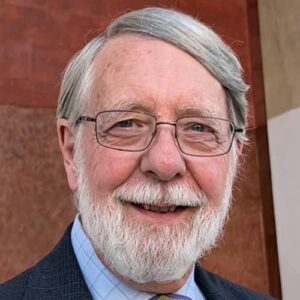 Gerald J. Postema is a Professor Emeritus at University of North Carolina at Chapel Hill (UNC-CH) and has made significant contributions to the fields of legal and political philosophy and ethics. Postema completed his PhD at Cornell University in 1976 and began his teaching career at Johns Hopkins University in 1975 and joined the UNC-CH in 1980, where he taught philosophy and law until his retirement. Postema has received numerous accolades, including an honorary doctorate from the University of Athens in 2016 and the George J. Johnson Prize for Distinguished Achievement in the Arts and Humanities from UNC-CH in 2012. He is a former Guggenheim Fellow, Rockefeller Fellow (Bellagio), Medlin Fellow (National Humanities Center), Fellow of the Netherlands Institute for Advanced Studies, and Visiting Fellow at the European University Institute (Florence).
Gerald J. Postema is a Professor Emeritus at University of North Carolina at Chapel Hill (UNC-CH) and has made significant contributions to the fields of legal and political philosophy and ethics. Postema completed his PhD at Cornell University in 1976 and began his teaching career at Johns Hopkins University in 1975 and joined the UNC-CH in 1980, where he taught philosophy and law until his retirement. Postema has received numerous accolades, including an honorary doctorate from the University of Athens in 2016 and the George J. Johnson Prize for Distinguished Achievement in the Arts and Humanities from UNC-CH in 2012. He is a former Guggenheim Fellow, Rockefeller Fellow (Bellagio), Medlin Fellow (National Humanities Center), Fellow of the Netherlands Institute for Advanced Studies, and Visiting Fellow at the European University Institute (Florence).
Among his many publications, some notable books include “Law’s Rule: The Nature, Value, and Viability of the Rule of Law” (2022), “Bentham and the Common Law Tradition” (2nd edition, 2019), and “Legal Philosophy in the Twentieth Century: The Common Law World” (2011). He has edited several significant volumes, such as the “Handbook of Legal Reasoning and Argumentation” (2018) and the twelve-volume “Treatise of General Jurisprudence and the Philosophy of Law” (2005-2016). His articles cover a wide range of topics, from professional ethics to jurisprudence and legal theory.
Herlinde Pauer-Studer is a Professor of Practical Philosophy and Ethics at the University of Vienna. She completed PhD in Philosophy at the University of Salzburg and has held several prestigious positions and fellowships, including being a Distinguished Visiting Austrian Chair Professor at Stanford University, a Fellow at the J. Safra Center for Ethics at Harvard University, and a Fulbright Scholar at New York University. Her research focuses on rationality, practical reasoning, and the normative distortions within legal and moral frameworks.
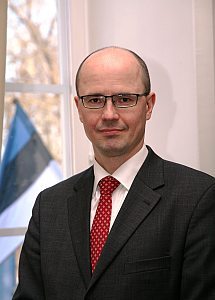 Madis Ernits is a highly qualified legal expert with extensive experience in both national and international law. He currently serves as a seconded national expert at the Court of Justice of the European Union in Luxembourg. Ernits has held various significant positions, including judge at the Tartu Court of Appeal and ad hoc judge at the European Court of Human Rights. He has also been a lecturer in constitutional law at the University of Tartu. His academic achievements include a PhD in Law from the University of Tartu, and he has been actively involved in numerous international legal training programs and workshops.
Madis Ernits is a highly qualified legal expert with extensive experience in both national and international law. He currently serves as a seconded national expert at the Court of Justice of the European Union in Luxembourg. Ernits has held various significant positions, including judge at the Tartu Court of Appeal and ad hoc judge at the European Court of Human Rights. He has also been a lecturer in constitutional law at the University of Tartu. His academic achievements include a PhD in Law from the University of Tartu, and he has been actively involved in numerous international legal training programs and workshops.
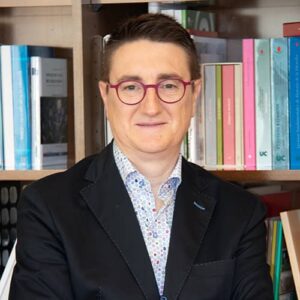 José Ignacio Solar Cayón is a Professor of Philosophy of Law. University of Cantabria, where he also serves as the General Secretary of the Social Council. His academic work focuses on the intersection of law and technology, particularly the implications of artificial intelligence in legal practices.
José Ignacio Solar Cayón is a Professor of Philosophy of Law. University of Cantabria, where he also serves as the General Secretary of the Social Council. His academic work focuses on the intersection of law and technology, particularly the implications of artificial intelligence in legal practices.
His work “La inteligencia artificial jurídica” examines the impact of AI on the legal profession, exploring various AI tools used in legal tasks such as automated decision-making, legal document drafting, and contract analysis. This book also discusses the broader social and labor implications of AI in law, including the emergence of legal tech industries and the reconfiguration of legal work. Additionally, his research topics range from the history of human rights to the ethical and legal challenges posed by technological advancements in the legal field.
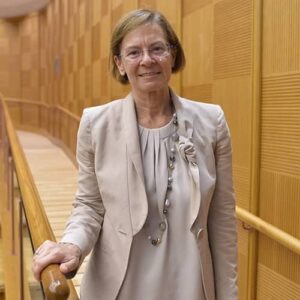 Luisa Torchia holds a law degree from the University of Rome, specializing in Administrative Law and is currently a full professor of Administrative Law at the University of Roma Tre. Torchia has published extensively on topics related to public administration, constitutional law, and European administrative law. Her work often focuses on the modernization and reform of public administration, as well as the intersection between administrative and constitutional law.
Luisa Torchia holds a law degree from the University of Rome, specializing in Administrative Law and is currently a full professor of Administrative Law at the University of Roma Tre. Torchia has published extensively on topics related to public administration, constitutional law, and European administrative law. Her work often focuses on the modernization and reform of public administration, as well as the intersection between administrative and constitutional law.
She has contributed to various academic projects and legal reforms and has been involved in numerous academic and governmental committees. Her publications include a wide range of books and articles addressing administrative responsibilities, public power, and legal frameworks within the context of modern governance.
 Lehte Roots has extensive expertise in European Union law, particularly in the areas of migration, asylum, citizenship, free movement, and equality law and policy within the European Union and Estonia. She earned her PhD from the European University Institute (EUI) in Florence, Italy and is currently a Visiting Professor of International Law at Tallinn University. Roots has participated in numerous EU-wide research projects related to free movement, asylum, detention, and migration, conducted for the EU Commission and the EU Parliament. In addition to her academic positions, Roots has been active in the legal field, working as a lawyer, coordinator, and board member of the Estonian Refugee Council.
Lehte Roots has extensive expertise in European Union law, particularly in the areas of migration, asylum, citizenship, free movement, and equality law and policy within the European Union and Estonia. She earned her PhD from the European University Institute (EUI) in Florence, Italy and is currently a Visiting Professor of International Law at Tallinn University. Roots has participated in numerous EU-wide research projects related to free movement, asylum, detention, and migration, conducted for the EU Commission and the EU Parliament. In addition to her academic positions, Roots has been active in the legal field, working as a lawyer, coordinator, and board member of the Estonian Refugee Council.
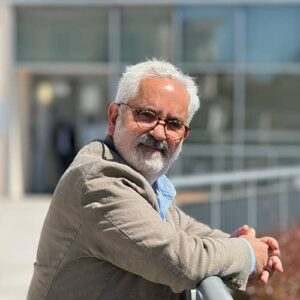 Francisco Javier Ansuátegui Roig is a professor at Charles III University of Madrid. His research and publications focus on the philosophy of law, theory of law, and human rights. Some notable works include “Orígenes doctrinales de la libertad de expresión” and “El positivismo jurídico neoinstitucionalista.” Ansuátegui Roig has also been involved in significant academic projects, such as the “History of Fundamental Rights,” a comprehensive multi-volume work directed alongside other distinguished scholars. He edits the journal “Derechos y Libertades” and has been actively engaged in various academic and editorial activities throughout his career.
Francisco Javier Ansuátegui Roig is a professor at Charles III University of Madrid. His research and publications focus on the philosophy of law, theory of law, and human rights. Some notable works include “Orígenes doctrinales de la libertad de expresión” and “El positivismo jurídico neoinstitucionalista.” Ansuátegui Roig has also been involved in significant academic projects, such as the “History of Fundamental Rights,” a comprehensive multi-volume work directed alongside other distinguished scholars. He edits the journal “Derechos y Libertades” and has been actively engaged in various academic and editorial activities throughout his career.
 Mart Susi is currently serving as a Professor of Human Rights Law at the School of Governance, Law and Society at Tallinn University. His academic career is marked by significant contributions to the study and promotion of human rights, particularly in the context of digital environments. Susi’s research includes significant work on the potential threats posed by artificial intelligence in content regulation and the importance of transparency and accountability in digital spaces. Susi holds a position as the leader of the Global Digital Human Rights Network (GDHRNet), where his work focuses on the intersection of human rights and digital technology. This network aims to enhance knowledge about human rights issues in the online world and develop methodologies for balancing conflicting rights and addressing online hate speech (GDHRNet). In addition to his teaching and research roles, Mart Susi was elected as a member of the European Union Agency for Fundamental Rights in 2022.
Mart Susi is currently serving as a Professor of Human Rights Law at the School of Governance, Law and Society at Tallinn University. His academic career is marked by significant contributions to the study and promotion of human rights, particularly in the context of digital environments. Susi’s research includes significant work on the potential threats posed by artificial intelligence in content regulation and the importance of transparency and accountability in digital spaces. Susi holds a position as the leader of the Global Digital Human Rights Network (GDHRNet), where his work focuses on the intersection of human rights and digital technology. This network aims to enhance knowledge about human rights issues in the online world and develop methodologies for balancing conflicting rights and addressing online hate speech (GDHRNet). In addition to his teaching and research roles, Mart Susi was elected as a member of the European Union Agency for Fundamental Rights in 2022.
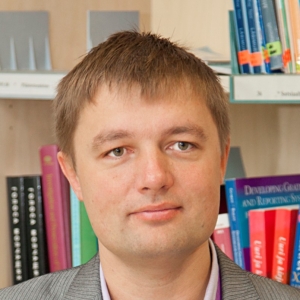 Leif Kalev is a Professor of Political Science at Tallinn University. His research interests encompass citizenship, democracy, state governance, migration policy, globalization, and transnationalization. Kalev has held several key positions at Tallinn University, including being the director of the Institute of Political Science and Governance from 2007 to 2012. He has also worked in the Estonian government, serving as the deputy secretary general on public order and migration policy and as the secretary general of the Ministry of the Interior. In addition to his roles in academia and government, Kalev was a visiting research fellow at the MacMillan Center for International and Area Studies at Yale University.
Leif Kalev is a Professor of Political Science at Tallinn University. His research interests encompass citizenship, democracy, state governance, migration policy, globalization, and transnationalization. Kalev has held several key positions at Tallinn University, including being the director of the Institute of Political Science and Governance from 2007 to 2012. He has also worked in the Estonian government, serving as the deputy secretary general on public order and migration policy and as the secretary general of the Ministry of the Interior. In addition to his roles in academia and government, Kalev was a visiting research fellow at the MacMillan Center for International and Area Studies at Yale University.
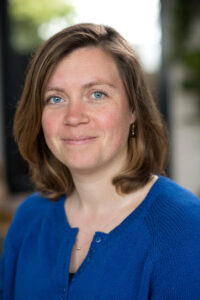
Marjolein Lanzing is Assistant Professor Philosophy of Technology at the University of Amsterdam. She completed her PhD titled “The Transparent Self: A Normative Investigation of Changing Selves and Relationships in the Age of the Quantified Self” at the 4TU Center for Ethics and Technology, University of Technology Eindhoven. Her research primarily focuses on the ethical implications of digital technologies, privacy, and the impact of technology on personal identity and social relationships. Additionally, she is involved with the Platform for the Ethics and Politics of Technology at UvA, contributing to interdisciplinary research and discussions on the ethical and political aspects of technological advancements.
 William Lucy serves as a Professor in the Durham Law School and Professor of Law in the Durham CELLS (Centre for Ethics and Law in the Life Sciences), previously holding professorships at the University of Manchester, Cardiff University, Keele University, and the University of Hull Law School. His academic journey includes undergraduate and postgraduate degrees in law, jurisprudence, and political philosophy. His research interests span adjudication and legal reasoning, legal philosophy, the philosophy of private law, and the normative standing of access to justice. Professor Lucy has supervised numerous doctoral students in the areas of private law subjects and legal philosophy. His notable publications include the monographs “Understanding and Explaining Adjudication” (1999) and “Philosophy of Private Law” (2007), both published by Oxford’s Clarendon Press. His latest book, “Law’s Judgement” (2017), was supported by the Leverhulme Trust.
William Lucy serves as a Professor in the Durham Law School and Professor of Law in the Durham CELLS (Centre for Ethics and Law in the Life Sciences), previously holding professorships at the University of Manchester, Cardiff University, Keele University, and the University of Hull Law School. His academic journey includes undergraduate and postgraduate degrees in law, jurisprudence, and political philosophy. His research interests span adjudication and legal reasoning, legal philosophy, the philosophy of private law, and the normative standing of access to justice. Professor Lucy has supervised numerous doctoral students in the areas of private law subjects and legal philosophy. His notable publications include the monographs “Understanding and Explaining Adjudication” (1999) and “Philosophy of Private Law” (2007), both published by Oxford’s Clarendon Press. His latest book, “Law’s Judgement” (2017), was supported by the Leverhulme Trust.
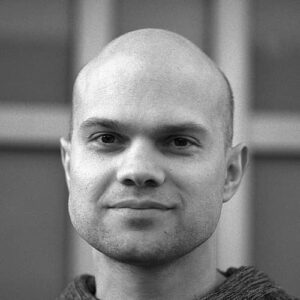 Jaan Aru is an accomplished neuroscientist known for his research in the fields of consciousness and cognitive neuroscience. Currently he is holding the position of Associate Professor in Computational Neuroscience and Artificial Intelligence in University of Tartu. Aru has made significant contributions to understanding the human brain, particularly in the context of artificial intelligence (AI) and the effects of online media. Aru’s research extends beyond traditional neuroscience to explore how digital environments and AI influence cognitive processes and behavior. Aru has also studied the impact of online media on the brain, particularly in children and teenagers. He is concerned with how extensive use of social media and other digital platforms can affect cognitive development, attention spans, and mental health. This research is part of a broader effort to understand the implications of digital technology on human behavior and to develop strategies for mitigating any negative effects.
Jaan Aru is an accomplished neuroscientist known for his research in the fields of consciousness and cognitive neuroscience. Currently he is holding the position of Associate Professor in Computational Neuroscience and Artificial Intelligence in University of Tartu. Aru has made significant contributions to understanding the human brain, particularly in the context of artificial intelligence (AI) and the effects of online media. Aru’s research extends beyond traditional neuroscience to explore how digital environments and AI influence cognitive processes and behavior. Aru has also studied the impact of online media on the brain, particularly in children and teenagers. He is concerned with how extensive use of social media and other digital platforms can affect cognitive development, attention spans, and mental health. This research is part of a broader effort to understand the implications of digital technology on human behavior and to develop strategies for mitigating any negative effects.
Oliver Laas is a researcher and lecturer with a multidisciplinary background in philosophy, cultural theory, and graphic art. Laas is currently serving as Junior Lecturer of Philosophy at Tallinn University where he also recently completed his PhD in Philosophy with the thesis titled “Toward a Nominalist Theory of Virtuality”. Laas’s research spans various fields including metaphysics, philosophy of information, logic, semiotics, philosophy of technology, and game theory. His work is notable for its focus on the philosophical implications of contemporary issues in technology and information. His works discuss the broader implications of AI on society and the human condition.
 Marina Lalatta Costerbosa is a full professor of Philosophy of Law at the University of Bologna’s Department of Philosophy and Communication. She has a diverse academic background, having first pursued a degree in philosophy with a focus on moral philosophy at the University of Bologna and then completing her doctorate in historical-political studies at the University of Turin. Her research spans several areas within philosophy of law and morality, particularly in how legal principles interact with ethical consideration. Her work also includes paradoxical aspects of law (such as those seen in Nazism and torture), bioethics, and violence against children. In addition to her academic roles, she has been involved in editorial activities and contributed to various scholarly journals.
Marina Lalatta Costerbosa is a full professor of Philosophy of Law at the University of Bologna’s Department of Philosophy and Communication. She has a diverse academic background, having first pursued a degree in philosophy with a focus on moral philosophy at the University of Bologna and then completing her doctorate in historical-political studies at the University of Turin. Her research spans several areas within philosophy of law and morality, particularly in how legal principles interact with ethical consideration. Her work also includes paradoxical aspects of law (such as those seen in Nazism and torture), bioethics, and violence against children. In addition to her academic roles, she has been involved in editorial activities and contributed to various scholarly journals.
First Session: Is Law withering away?
Giuliano Amato / The death of law? Law, as a human product, is immortal
All of us are familiar with the two notions of law that respectively prevail in civil law and in common law systems. In the former the law is identified with the legislative rules adopted by the holders of legislative power. As to judicial decisions, some doctrines read them as mere syllogistic applications of the legislative rules, others underline the appreciation of the judge as to the interaction between the facts of the case and such rules. However, the pre-eminence of legislation as the source of law is undisputed.
In common law systems, the law is the law of the case, not necessarily in conformity to statutory rules, but also based on a well settled sequence of judicial precedents, in any event largely fruit of judicial discretion.
Whatever the remaining difference between the two systems, after the harmonizing effects of their long coexistence in the European Union, they give us the same answer to the questions posed by the entrance of our new technological partners, from algorithms to AI: will they replace us? Whatever we mean by law, will they be better authors both of legislative regulations and of judicial decisions?
Algorithms can give us what they have been nurtured with. Therefore they can give us the precedents, all the precedents with an unparalleled perfection. Which means that they know everything about previous regulations of the conduct, the facts, the object we want to regulate anew.; they don’t know anything about the policies, the aims and the intentions we want to embody in our regulation. Similarly, they know all the precedents of the case we have to decide upon; they don’t know anything about the specificities of such case; they don’t know the persons that are involved in it.
Generative artificial intelligence does more than giving precedents, it can elaborate on the facts we have to legislate (or to decide) upon and offer solutions. Can we rely on them? No decision, either judicial or legislative, is predetermined by the precedents. Ignoring the specificities of the conducts, of the facts and of the personalities involved in the case might easily lead to the wrong decision (example: the US judge deciding detention or freedom on parole).
Ignoring our aim might lead to a wrong path of regulation (example: Italian privatizations in 1992). Therefore: let us use the precedents we receive, but only after checking each of them, one by one. Let us carefully consider suggestions both of frames and of regulatory patterns. However, never forget that our human mind is essential to perceive the present and to conceive the future.
Roger Brownsword / Law’s Imperfect Governance
This paper draws on two recent books, Technology, Humans and Discontent with Law (2023) and The Future of Governance (2024), and it anticipates the argument in a book-in-progress, Governance Projects, Governance Problems, and Governance Prospects.
The paper starts with an innocent question: what should we make of law’s imperfect governance? It sketches a range of responses that reflect the views of respondents who stand at different points on, so to speak, the Law-Tech spectrum. And, then, in the manner of a Trojan horse, it reveals its true mission, which is to move beyond perspectives on the Law-Tech spectrum and, instead, adopt an overarching perspective of governance and good governance.
This overarching perspective begins to articulate a new arc of development for law and technology where both law-like and tech-based governance projects invite assessment; where good governance, albeit a contested concept, can be applied systematically to test whether governance projects are compatible with foundational and fundamental values as well as being socially acceptable; where governance acts as a bridgehead to conversations with other disciplines (for example, to address concerns about existential risk); and where lawyers can identify with a shared mission not only to contribute to better governance but to sustain the conditions for viable governance.
Gerald Postema / AI in Law or AI in the Place of Law?
We hear proposals for a robust and widely deployed “artificial legal intelligence” (ALI). Its advocates look to the day when computational intelligence will exceed the intelligence and capabilities of judges, legal officials, and lawyers. The future envisioned by these advocates is not one of increased role of AI in support of law and legal reasoning, but of AI replacing them. These proposals raise many concerns—moral, practical, and conceptual—but this talk will assess these proposals in light of the rule of law. Is what AI systems do legal reasoning? More generally, can they, now or in the future, govern, regulate, or sustain social order in the manner of law? And, if not, what if anything is lost if we install AI in the place of law? Does wide-scope ALI offer an alternative understanding of the rule of law? Or does it propose to replace the rule of law with the rule of algorithms?
Second Session: Rules and Algorithms
Madis Ernits
José Ignacio Solar Cayón / AI-assisted judicial decisions in Spanish legislation AI is increasingly present in the Administration of Justice. In the European Union, the recently approved Artificial Intelligence Act expressly provides for its use in the judiciary, including among high-risk AI systems those intended to be used to assist judicial authorities in researching and interpreting the facts and the law, and in applying the law to a concrete set of facts.
In this context, in December 2023, a legal reform in Spain has introduced the possibility of using AI to produce so-called “assisted proceedings”. Assisted proceedings are defined as those in which an algorithmic system “generates a full or partial draft of a complex document based on data that may form the grounds for or inform a judicial decision”. In line with the provisions of the European Act, this new Spanish regulation states that in no case will the automatically generated draft be a court decision without validation by the competent judicial authority, who will always be accountable for the resolution. In addition, it lays down that the AI systems used in assisted proceedings must ensure, first, that the draft is only generated at the behest of the judge and, second, that the draft can be freely modified by the judge to whatever extent he deems necessary. And that´s all. This is the scant and insufficient regulatory framework established in the Spanish Act.
In light of this situation, the talk focuses on three issues that must be taken into account to ensure that the use of these algorithmic judicial assistants is consistent with the ideal of the rule of law: first, in what kind of court rulings can they be most useful?; second, what technical characteristics should these systems have?; and third, how should these systems and their outputs be used?
Luisa Torchia / Algorithmic legality and automated administrative decision
Lehte Roots / Algorithms and law – do computers understand law?
ALI – Artificial legal intelligence is able to calculate legal prediction and argumentation which is based on machine learning. This raises the question of whether the implementation of such technologies should count as law or regulation, and what this means for further development. Further, I propose that data or code-driven regulation should be brought under the rule of law. This also includes intervention at the level of algorithm design. I am going to discuss and look for answers to the question, “Do algorithmic decision systems require new types of interpretability, in the context of machine learning and law? Does this require new legal interpretation, so that computers could understand law?” I argue that lawyers need to get more involved in ALI and smart regulation. I suggest that this will require a new interpretation of legal vocabulary which is comprehensible to both humans and machines. As an example, I argue for ‘case-specific machine learning’, which should bring competitive contestation into the heart of the design of ALI. Despite their profound and growing influence on our lives, algorithms remain a partial “black box.” Keeping the risks that arise from rule-based and learning systems – is a challenging task for both society and the legal system.
Third Session: Rights, Democracy, and Machines
Francisco J. Ansuátegui Roig / Technology and new normativities
The relationship between technology and Law is complex: technology, in its implications for rights and freedoms, must be subject to legal regulation. But, at the same time, technology is presented itself as a regulatory agent. Technology forces us to reformulate the characteristics of normativity; at least, the characteristics of the normativity that we identify with modern Law. Today we are witnessing the development of new forms of normativity that have consequences for our understanding of Law. For example, we can think of the loss of relevance of the intervention of the judge, understood as an impartial third party who resolves the conflict, from the moment in which the conflict disappears as a consequence of the conversion of the illicit into the impossible. At the same time, the new normativities, precisely by eliminating the possibilities of opposition to the norm, eliminate the critical dimension of the citizen with respect to the Law. The elimination of criticism weakens democracy. In this scenario, the end of Law and its regulatory capacity may be determined by the emergence of new forms of normativity, in which the very idea of normativity is subject to reformulation.
Mart Susi / Non-coherence theory of digital human rights
Professor Susi introduces a novel non-coherence theory of digital human rights to explain the change in meaning and scope of human rights rules, principles, ideas and concepts, and the interrelationships and related actors, when moving from the physical domain into the online domain. The transposition into the digital reality can alter the meaning of well-established offline human rights to a wider or narrower extent, impacting core concepts such as transparency, legal certainty and foreseeability. The theory also addresses the ‘loss in transposition’ of some core features of the rights to privacy and freedom of expression. The non-coherence theory is used to explore key human rights theoretical concepts, such as the network society approach, the capabilities approach, transversality, and self-normativity, and it is also applied to e-state and artificial intelligence, challenging the idea of the sameness of rights. The theory was published in a monograph by Cambridge University Press in 2024.
Leif Kalev / Digitalization and democracy
The presentation will focus on the transforming relations of digitalization and democracy, amplified by the current datafication and the development of artificial intelligence. It is based on an understanding of democratic politics and governance as human-centered and human-oriented activities (broadly in line with Arendt, Crick, Hay, Bevir, Stoker and others). Digitalization offers both opportunities and threats for a democratic polity and political community. This will be discussed in the contexts of datafication and algorithmization, autonomous devices and artificial intelligence, surveillance and securitization, and the further transformation of the media, politics, policy and governance (see e.g. Bigo et al 2019, Hintz et al 2019, Susskind 2020, Evans, Stoker 2022). In conclusion, a broader perspective of relating digitalization and democracy in contemporary conditions will be developed.
Marjolein Lanzing / The Risks of Traveling Surveillance Technologies
In this talk, I critique the expansion of surveillance using Sharon’s conceptual framework of ‘sphere transgressions’. The increasing use and deployment of surveillance technologies within the sphere of security has been a classic and important topic of debate. Whether taking a liberal or republican perspective on democracy, the value privacy features as an important safeguard for living an autonomous life or a life of non-domination. But what if surveillance companies expand their activities across spheres? For instance, during the pandemic we witnessed how technologies, developed for security purposes, were deployed for monitoring the spread of Covid-19, forging new ties between national health institutions, governments and Big Tech in the EU. Critique often remained limited to individual data protection law. I argue that, while important, this concern fails to capture the risks and harms of this expansion. We should anticipate the risks of no public returns, dominance, and new dependencies, which undermine democracy. While this might be true for many Big Tech actors, I add that expansions from the security domain warrant special vigilance as this sphere is extremely politicized. Importing surveillance technologies from this sphere into another means risking importing perverted logics that originated in the context of exclusionary, discriminatory politics, perpetuating social injustices.
Fourth Session: Humans as Obsolete Actors?
William Lucy / Human Agency in the Face of Technological Management
This talk examines the role of human agency within two competing regulatory paradigms: law and technological management. In the first part, I sketch both paradigms and suggest that the direction of regulatory travel in familiar jurisdictions is from the former and toward the latter. In the second part, I examine the possible effect of this transition upon human agency. I offer and defend a general account of agency, distinguish that notion from autonomy, and show that that account informs the legal regulatory paradigm. I then consider whether agency, so conceived, can persist and flourish within a technological management regulatory context. I do so by reference to a thought-experiment. That experiment, and two of three responses to it, assumes that agency can be quantified and in the final part of the talk I show how that could be done. I conclude by suggesting that a transition from legal regulation to technological management might reduce the amount of human agency in the world and imperil other important values.
Jaan Aru / What’s next for humans?
The rise of artificial intelligence (AI) brings us to a crossroads as humans. Either we will offload more and more skills and abilities to AI, or we will emphasize that AI systems need to enhance human intelligence. Currently it seems that the default option is the first one: AI algorithms get more capable, and humans are happy and naive enough to offload cognitive tasks to these systems. I will highlight the hidden costs of offloading too much to AI and highlight the more human-centered version of our future collaboration.
Marina Lalatta Costerbosa / In Search of Lost Imagination. Günther Anders’ Concept of homo machina
Günther Anders’ invective against technocracy does not lead to an uncritical exaltation of the past or what is by nature. Anders promotes the defence of critical reflection and the exercise of imagination. He believes in the need to reinforce awareness of what is at stake, what values are at stake and what capacities can be lost by playing the game of the pervasive ‘machinisation’ of society.
Against the backdrop of the ever new frontiers of artificial intelligence, Anders is still a relevant author, because he does not advocate regressive gestures; rather, a ‘true’, ‘critical’ progress, towards which to strive. No rejection of technology in the name of an implausible naturalistic dream, but rather the full control of human progress, through the recovery of our lost moral imagination
Oliver Laas / The Age of Moralizing Machines: AI and Technology Paternalism
The behavior of AI systems is governed by technical norms. These can facilitate technology paternalism by limiting user freedom ‘for their own good’. Since technical norms control user behavior in accordance with legal or moral requirements, it’s pertinent to ask, whose norms are embodied in AI technologies and what are the costs of automating legal and moral decisions. I argue that the extant moral and legal requirements codified in technical norms can hamper the creation of speech that could spur legal, moral or societal change by initiating normative disputes.
